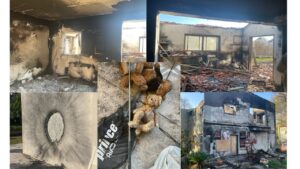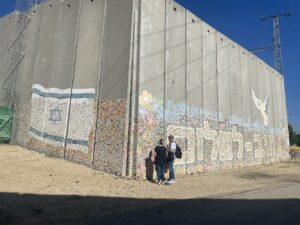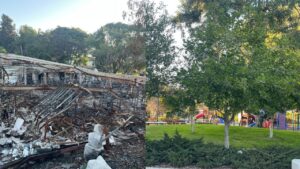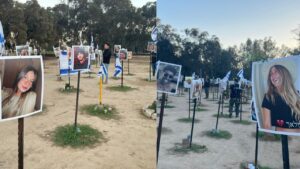Yesterday I went on a trip to the South of Israel, where the October 7 attack took place. It was January 7, exactly 3 months after.
We were a group who went to bear witness to the atrocities and show that we care, that we see the people who are so painfully impacted and that we’re not standing on the side and continuing our lives. The stories need to be told and even more than that, seeing it in person, brought about another dimension of grief that I had not yet experienced.
Before I went, I already knew a lot about what occurred on that day – the stories of families that were brutally attacked, raped, murdered and burned. Being there in person – seeing the sites, being taken around by the people who lived there, smelling the smells, breathing the air was another level of awareness in this tragic, horrendous situation.
We stepped into houses that showed signs of regular day-to-day life – teddy bears on the floor, shoes outside the door, dishes in the sink. At the same time, you see the blackened walls, bullet holes in the walls, doors, floors, ceiling, furniture in disarray. Layered on top of that, is the house’s story of what happened that day.
A father and son holding on to the safe-room door while being shot at, the house burning down, explosives stuck on the doors and walls – anything to get in and murder the people inside. It’s a miracle when some survived. And only some did. Every family has casualties.
This house with the story of father and son holding on to the door while being shot at has a grim ending. The son’s arm was shot off. He died from his injuries. Mom was shot to death. Injured Dad continued holding on to the door for hours for the sake of his surviving daughter who was also in the safe room with them. He had to have his leg amputated. We saw the aftermath.
We walked around villages that are empty of people – families have been evacuated. And every day some return to show people around what’s left. They relive the stories and tell us only a drop of their experience, while police and army continue to guard these areas from further attacks.
What does it mean to feel safe? What does it mean to feel secure enough to return to your home? No-one has an answer for this right now but some residents continue to hope for some sort of peace and hope that they can maybe return to their homes one day. Right now, it’s a big “maybe.” Some residents have given up on the idea that they will ever return. They are trying to rebuild their lives and see a way to make some kind of future elsewhere for themselves and their families.
At Netiv Ha’asarah, the Israeli village that sits closest to the Gaza border, lived people who believe in peace. These people were continuously involved in projects bringing the two nations together. Before October 7th, visitors would come to see what’s possible if when people work towards peace. On the wall, constructed to protect against constant sniper attacks and missiles from Gaza, visitors would stick a ceramic symbol of peace, in the hope of creating a better world. But all this and more was shattered on that fateful day.
If you look at Kibbutz Be’eri from one side, you see the beauty – green parks, trees and swing sets. But look a little to the left and you see a burnt down structure that used the be the shopping area – unrecognizable, burnt to a cinder, rubble and some ravaged metal frames.
Some 90 people dead in Be’eri and 350 families shattered, dispersed all over Israel. And this is but one of the many villages, kibbutzim and cities that were attacked.
We saw and heard the story of the Sderot police station that was overtaken by terrorists, now demolished. People at their moment of greatest need, called the police station only to be answered by a terrorist telling them, “the police station is gone, there’s no-one to help you, we’re coming to kill you too.”
We saw the area where the Nova music festival took place, a memorial for more than 300 dead and 140 still kidnapped. The smell of death still hangs in the air as you look at the forests, the green fields and the peaceful beauty of the place, only picturing the images we’ve seen of people running, as they were hunted down, shot at and worse.
Exhausted and drained, we ended the day at Tzomet Gilat, where soldiers come to get some food, clean showers and laundry. There’s even a hairdresser on site. They are risking their lives every day to keep us safe.
In the echoes of shattered homes and the haunting silence of deserted villages, the question lingers in the air: How do we rebuild not just structures but the broken pieces of lives?
As we carry these stories forward, may our collective resolve be unwavering—to strive for a world where the scars of yesterday inspire the unwavering commitment to ensure that ‘never again’ is not just a phrase but a promise etched into our shared humanity.
Let’s make sure this can never happen again.
Am Yisrael Chai 🇮🇱




